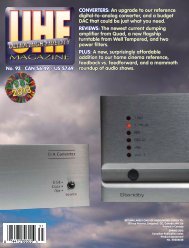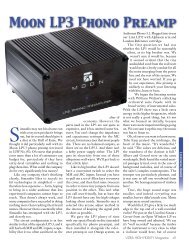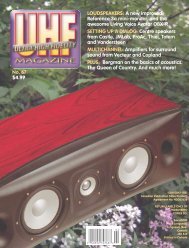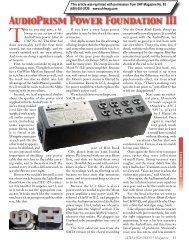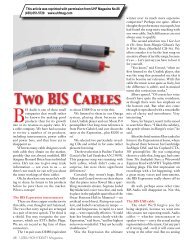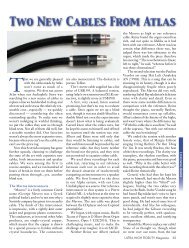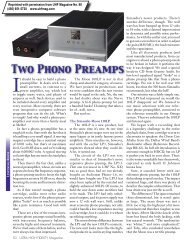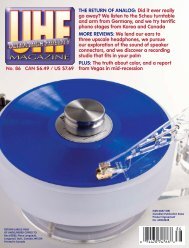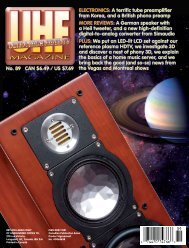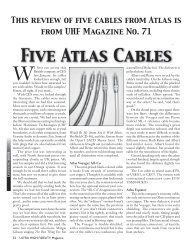ANALOG vs DIGITAL - Ultra High Fidelity Magazine
ANALOG vs DIGITAL - Ultra High Fidelity Magazine
ANALOG vs DIGITAL - Ultra High Fidelity Magazine
You also want an ePaper? Increase the reach of your titles
YUMPU automatically turns print PDFs into web optimized ePapers that Google loves.
them what should have been a rendezvous<br />
with glory: an audition at Decca.<br />
Disappointment. Producer Dick Rowe,<br />
who opts instead for a group called Brian<br />
Poole and the Tremolos (Remember<br />
them? No?), will eternally be known as<br />
the man who passed on the Beatles.<br />
But they are able to build on their<br />
audition, appearing the next month on<br />
TV’s Thank Your Lucky Stars, where My<br />
Bonnie captivates six million viewers. In<br />
a flash, they move beyond their working<br />
class roots to captivate the larger British<br />
society.<br />
In April they learn of the death of<br />
their friend and former colleague Stu<br />
Sutcliffe. They fly to Hamburg for the<br />
funeral, where, in any case, they have<br />
another seven-week gig at the Star Club.<br />
A third decisive step<br />
After the Decca flop, Epstein searches<br />
high and low for another producer, and<br />
finally finds one at EMI. He is the A&R<br />
man at Parlophone, a small label EMI<br />
is actually thinking of killing off. His<br />
name is George Martin, an elegant man<br />
and a Guildhall Music School graduate.<br />
He will become a counsellor, a peerless<br />
arranger and a prolific producer for the<br />
group. No doubt eager to keep his label<br />
alive, he tells Epstein he is willing to<br />
consider recording his Beatles. On June<br />
6, 1961, a key date, the Beatles arrive in<br />
George Martin’s Parlophone studio.<br />
Martin is not immediately enchanted<br />
by either the old or the new repertoire,<br />
and in particular he is not taken with<br />
drummer Pete Best. Besides, solo singers<br />
are all the rage just now. “I’ll call you,”<br />
he says.<br />
More than a year will go by before he<br />
does. Probably fascinated by certain new<br />
aspects of the group — John’s personality,<br />
Paul’s voice, George’s guitar, and<br />
especially the unique harmonies — he<br />
finally agrees to make a record with<br />
them. Hearing the announcement from<br />
Epstein, John, Paul and George forget to<br />
tell Pete Best…who hears the good news<br />
at the same time he learns the bad news:<br />
he is no longer a Beatle. His replacement<br />
is Richard Starkey, whose ostentatious<br />
display of rings on each finger have<br />
earned him the nickname Ringo.<br />
Already a noted drummer, Ringo will<br />
create a distinctive beat for the group. At<br />
the same time, his personal qualities will<br />
contribute to holding together a group<br />
whose members have highly divergent<br />
temperaments. Later acknowledged as<br />
the greatest drummer in rock’n’roll, the<br />
modest Ringo will contribute mightily<br />
to the group’s fame and fortune, all the<br />
while keeping his place at the back of<br />
the stage. Still, George will later say that<br />
“Playing without Ringo is like driving a<br />
car on three wheels.” John will call him<br />
the heart of the Beatles.<br />
Epstein seeks to influence neither<br />
their repertoire nor their haircuts,<br />
but he imposes some discipline on his<br />
charges. They must no longer drink<br />
beer on stage, and they must ditch their<br />
scruffy leather jackets. On March 7th<br />
the Liverpool lads appear on the BBC<br />
in dark suits, metamorphosed into young<br />
gentlemen prepared to be introduced to<br />
London society. Not that the change<br />
of look will take away from either their<br />
exuberance or their irreverence.<br />
In the Summer of 1962 John Lennon<br />
learns that his girlfriend Cynthia is<br />
pregnant, and marries her, though their<br />
marriage will long be kept from John’s<br />
adoring fans. Ringo gets engaged to a<br />
local hairdresser he has adored since<br />
childhood, Maureen Cox.<br />
George Martin still isn’t convinced<br />
of Ringo’s value. In a studio session in<br />
September, he calls in a studio drummer,<br />
relegating Ringo to playing the tambourine<br />
and the maracas. Several takes of<br />
a new song, Love Me Do, are recorded,<br />
but — surprise — the one Martin<br />
chooses to release is the one made with<br />
Ringo behind the drum kit. The single is<br />
released in October. During the last two<br />
months of 1962 the Beatles will return<br />
to Hamburg twice. They will never go<br />
again.<br />
What is unsuspected is that their<br />
second single will be a monster hit.<br />
The magic happened at the end of<br />
a tiring practice session at Parlophone.<br />
“It was a hard day…” says a discouraged<br />
Ringo, adding “…day’s night.” The<br />
phrase will of course return as the title<br />
of a song and a movie, but Paul and John<br />
join in. “It’s this rubbish we’ve been<br />
practicing. We could write better stuff<br />
than this ourselves.”<br />
“Go ahead,” suggests George Martin.<br />
The two Beatles work all night and<br />
return to the studio the next morning<br />
with a new song, Please Please Me. Martin<br />
listens to them playing it. “Gentlemen,”<br />
he says, “you have your first number one<br />
hit.”<br />
Rare are producers like Martin.<br />
Beyond his authentic knowledge of<br />
music, he is talented and passionate,<br />
and well connected too. He introduces<br />
the Beatles to Dick James, a 50’s singer<br />
turned publisher, who will publish the<br />
Beatles’ music. Publishers get half the<br />
gross from song sales, and so he will of<br />
course become very rich.<br />
But do the Beatles have a future?<br />
They now have a publisher, a producer,<br />
a manager, TV appearances, and two<br />
singles, one of them No. 17 on the<br />
charts. None of this is enough to awaken<br />
the interest of the press. Epstein faces<br />
the truth: the Beatles may fill the halls<br />
ULTRA HIGH FIDELITY <strong>Magazine</strong> 63<br />
Software



